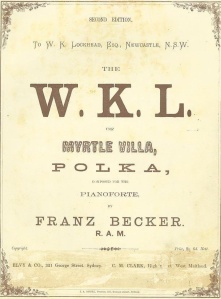Forgotten Composers and their music
In the 1870s Newcastle was rapidly expanding and mining townships such as Lambton and Wallsend, founded in the early 1860s, were developing lively cultural scenes. Through the lens of the local newspapers we learn of music and drama societies, brass bands, choral unions, benefit concerts, Caledonian games and eisteddfods, to name just some cultural activities. Outdoor events such as picnics, demonstrations, parades and horse races were not complete without the sound and repertoire of the brass bands. Dancing was very popular and it was not unusual for community dances to run right through the night, finishing at 5am. Generally, brass bands (sometimes string bands) supplied the music for these dances, usually referred to as balls or quadrille parties. Dancing also took place at holiday events, such as excursions, picnics and at the races. In fact, the brass band’s contribution to the enjoyment of these events was so central that, when a band was absent from the Newcastle Races, the Newcastle Chronicle commented,
One great attraction was missing, that of a band of musicians and this no doubt prevented many from attending (Newcastle Chronicle, 10 November, 1870).
Brass bands also performed regularly at the Asylum for Idiots and Imbeciles (as it was known in the 1870s), Watt Street. Their programmes were often included in the newspaper advertisements. These programmes were fairly typical of the period, being made up of marches, dances and medleys from the operas of the time. It often fell to the bandmaster to arrange music for the bands, as well as compose new music. The following programme is taken from the Newcastle Chronicle, 7 November 1874
This programme provides a fascinating snapshot of the kind of music that was popular at the time and the value placed on new original music that was often tied to place, at least in the title. During this period, township benefit concerts (which were an important means of raising money for injured miners or miners’ widows and families) were also publicised through the newspapers. The advertisements often included details of the music and this is another source for repertoire of this period. In these programmes there are other musical works by local composers such as Marmaduke Wilson (c. 1834-1871), Edward Faning (c. 1819-1870), Henry Meulman (1832-1879), Henry Prince (1827-1872), Marmaduke Wilson (c. 1834 -1871), Colin Christie (1836-1916), Robert Bishop Theobald {fl.1858-74; died 1876}, Franz Louis Leopold Becker (1840-1897) and Roland Randolph Arndell (1857- 1920). An example of a locally produced work is Franz Becker’s Myrtle Villa Polka, dedicated to Mr W. K. Lockhead, who lived at Myrtle Villa, Cook’s Hill (see below).

This piece has happily been preserved and is available to anyone through Trove on the National Library of Australia website.
http://trove.nla.gov.au/work/9286929?q=+&versionId=48577786
However, there are many pieces, like the Franz Becker’s Variations on ‘Last Rose of Summer’ for Left Hand and the Newcastle Election Gallop or J.M. Gates’ Pride of the North Waltzes (see the Burwood band programme above) that I have been unable to find. Some of this music may still be somewhere in the community – perhaps in a piano stool or attic or brass band library.
